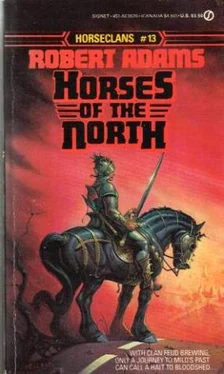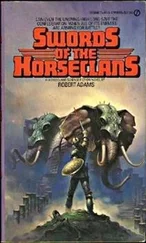Milo tried to avoid stretches of true desert as much as was possible, traveling on or near highways when it proved at all feasible, adapting a fortunate find in the lot of a long-deserted business of several dozen U-Haul trailers to horse- or mule- or ox-draft vehicles. At length, he decided to head them in the direction of Lake Tahoe, figuring that at least there was certain to be a plentitude of water thereabouts, likely graze and game, and, just possibly, enough arable land to settle down and farm. He faced the possibility that there might be people already there, as well, but numbering as they did some fourscore armed men of fighting age, not to mention quite a few women who were as adept with the bow as any man, he felt certain that they could either overawe or successfully drive off any current residents.
As it developed, the forty-odd families living and trying to exist safely in the environs of the lake under the overall leadership of a middle-aged onetime Regular Army officer and sometime survival buff named Paul Krueger were more than happy to see an additional seventy or so well-armed men added to their numbers, beset and bedeviled as they were by the periodic incursions of a large pack of motorcycle-mounted raiders some hundred or more strong, heavily armed and mercilessly savage.
Milo had had no stomach for settling down and awaiting the next raid. He and Krueger had pooled their available men and resources and staged a night raid of their own on the cyclists, who had become over the years so cocksure that they no longer troubled themselves to mount perimeter guards. No prisoners had been taken, but quite a hoard of secondhand loot and quantities of arms and ammunition, clothing, boots and gear had been liberated by the allies. Liberated, as well, had been scores of male and female slaves of the bikers, most of the women either with children or pregnant; those originally kidnapped from Krueger’s settlement were returned to their families if any relatives still lived, and most of the remainder accepted Milo’s offer to join his band. The things that these former slaves told him of their deceased captors caused him to wonder if it might not be wiser to move on—north, east or south, anyplace but west.
He had been informed that the bunch just exterminated had made up only the westernmost “chapter” of a highly organized pack of outlaws most of whom were scattered over northern California and southern Oregon on the western side of the mountains. He had been informed that these human predators numbered upward of a thousand, were very well armed and made regular visits to the now-extinct chapter for the primary purpose of collecting a share of loot and slaves.
“What you and your people do is entirely up to you,” he had told Paul Krueger bluntly. “But as soon as this winter’s snows are melted enough to allow for it, my people are moving on, northeast, probably.
There’s simply not enough really arable land hereabouts to support all of us—yours and mine, plus our herds—without spreading out so thinly that we’d be easy victims to those thousand or more bikers just across the Sierra. I haven’t wet-nursed my kids and theirs for twenty years to watch many or most of them killed off fighting scum like the pack we were fortunate enough to surprise up there in Tahoe City. When the parent chapter gets up here next spring, you can just bet that they’re going to be none too happy to find out that we killed off every one of the local biker-raiders, thoroughly looted the headquarters and then burned it to the ground, so I will be a damned sight easier of mind with miles and mountains between me and mine and those murderous outlaws.”
Krueger had sighed long and gustily, replying, “Twenty years, huh? Then you must be some older than you look or act, Moray, probably closer to my age. But, hell, you’re right and I know it; our combined hundred and fifty men and boys would stand no chance against a thousand, not even against half of that number, not with as few automatics as we have and no heavy weapons at all except those two homemade PIAT projectors and a few hand grenades.
“You’re right about the farmlands and graze, too, and there’s something else that maybe you don’t know or hadn’t noticed yet: the rains haven’t been as regular and heavy nor the snows as deep in these last few years. Some of the smaller streams are either dried up or are just trickles and the level of the lake has dropped off several feet, and who knows why? I sure as hell don’t. Maybe all the nukes changed the climate like the nervous Nellies used to claim they would if they were ever used.
“So, okay, we all move out of here come spring. But where? We’re almost completely surrounded by some of the worst, godawful deserts on this continent and we’ve got damned little transport and little POL for what we do have. What the hell are we going to do if we run out of gas and there isn’t any at the next town or crossroads?”
Milo had found the answer to this conundrum while, mounted on captured motorcycles, he and a party of men scouted the route northeast to the Snake River Valley, their agreed-upon destination. Just north of Carson City, they came across a roadside attraction, a “PioneerDaysMuseum.” Among other things within the sprawling building were two different types of reproductions of Conestoga wagons, a huge-wheeled overland freight wagon, a Red River cart and several other recreations of animal-drawn vehicles, plus a wealth of printed material detailing their construction, use and maintenance. Complete sets of reproduced harness adorned fiberglass horses, mules and draft oxen.
After Krueger and some of his men, including his blacksmith, had journeyed north and looked over the displays, they had hitched the reproductions onto pickups and jeeps and towed them back home, then taken them all apart and set about turning out their own copies of wheeled transport, harness and other relics, while other men and women devoted themselves to training horses, mules and the few available oxen to horse collar, yoke and draft.
It was at length decided, after a conference with the smith and some of the on-the-job-training wainwrights, that the wagons simply took too much of everything—time, materials and effort—to reproduce properly in the numbers that would be needed, and so with the completion of the wagons already in the works, all of the labor was put to making Red River carts instead.
Other crews were kept busy through the last of the summer, the autumn and the winter bringing truckload after truckload of seasoned lumber from lumberyards far and near, seeking out hardware items, clothing, bedding, canvas sheeting, tents and the thousand and one things needed for the coming trek north.
Unlike most of his companions on these foraging expeditions, Milo had been in or at least through some of the towns and cities they now were plundering in the long ago, and he found the now-deserted and lifeless surroundings extremely eerie, with the streets and roads lined with rusting, abandoned cars and trucks, littered with assorted trash, the only moving things now the occasional serpent or scuttling lizard or tumbleweed. Only rarely did they chance across any sign of humans still living in the towns and cities, and these scattered folk were as chary as hunted deer, never showing themselves, disappearing into the decaying, uncared-for buildings without a trace. Milo suspected that these few survivors had bad memories from the recent past of men riding motorcycles, jeeps and pickups.
Every city, town, village, hamlet and crossroads settlement seemed to have its full share of human skulls and bones and, within the buildings—especially in those closed places that the coyotes, feral dog packs and other scavengers had not been able to penetrate—whole, though desiccated, bodies of men, women and children of every age. Although he and Krueger had come to the tentative conclusion that those humans who lived on in health while their families, friends and neighbors had died around them in their millions must be possessed by some rare, natural and possibly hereditary immunity to the plagues, he nonetheless tried to keep his crews from too-near proximity to the dried-out and hideous corpses, figuring they were better safe than sorry in so deadly serious a matter.
Читать дальше












